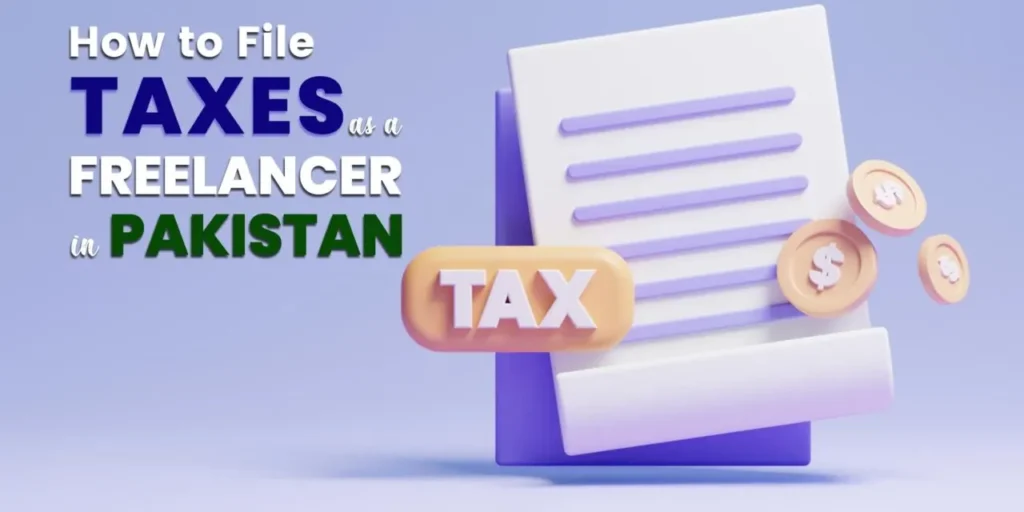Introduction
Freelancing is booming in Pakistan, with thousands earning through platforms like Upwork, Fiverr, and Freelancer. But one common concern remains: How do freelancers file taxes in Pakistan?

If you’re confused about FBR rules, tax slabs, and the filing process, this guide simplifies everything. Filing taxes may seem overwhelming at first, but with the right knowledge, you can efficiently manage your tax responsibilities and even benefit from deductions that reduce your overall taxable income.
Understanding tax laws is crucial for freelancers who wish to maintain financial stability, avoid penalties, and maximize their income. Whether you are a new freelancer or an experienced one, knowing how taxation works will help you manage your finances better and enjoy the benefits of being a tax filer.
Who Needs to Pay Taxes as a Freelancer in Pakistan?
If your annual income exceeds PKR 600,000, you are legally required to file taxes with the Federal Board of Revenue (FBR). Even if you earn less, filing taxes helps you stay compliant and avoid penalties. Being a filer also brings numerous benefits such as lower withholding taxes on banking transactions, property purchases, and vehicle registrations.
Freelancers earning income through international clients or foreign platforms often receive payments via Payoneer, Wise, or direct bank transfers. Even though these are foreign remittances, they are still subject to taxation under Pakistan’s income tax laws.
Additionally, freelancers who earn below the taxable limit may still file their returns to claim refunds or ensure that their tax profile remains active. Maintaining an active tax record helps in securing loans, visas, and other financial benefits.
Understanding Tax Slabs for Freelancers (2025)
Freelancers are categorized under “Income from Business” in FBR’s tax laws. Here’s a simplified breakdown of the tax slabs:
| Annual Income (PKR) | Tax Rate |
| 0 – 600,000 | 0% |
| 600,001 – 1,200,000 | 2.5% |
| 1,200,001 – 2,400,000 | 12.5% |
| 2,400,001 – 3,600,000 | 20% |
| 3,600,001 – 6,000,000 | 25% |
| Above 6,000,000 | 35% |
Note: Tax laws are subject to change, so always verify on the FBR website (https://fbr.gov.pk). Understanding where you fall in these tax slabs allows you to estimate your tax liability beforehand and plan your finances accordingly.
Common Tax Deductions for Freelancers
Good news! Freelancers can deduct certain expenses from taxable income, reducing their tax liability. Here are some common deductions:
- Internet Bills – If you use the internet for work, this is deductible.
- Laptop & Equipment Costs – Purchases related to work can be deducted.
- Co-working Space Fees – If you rent office space, claim it.
- Software Subscriptions – Tools like Adobe, Grammarly, or VPN services are deductible.
- Bank & Transaction Fees – Charges on Payoneer, PayPal, or Wise can be claimed.
- Marketing & Advertising – If you run ads to promote your services, these expenses can be deducted.
- Professional Training & Courses – Enrolling in skill development courses can also reduce taxable income.
Keeping detailed receipts helps when claiming deductions. Maintaining a proper record of these expenses can make filing easier and ensure that you don’t miss out on deductions that legally lower your tax bill.
Additionally, freelancers can claim deductions for office utilities, phone bills used for business purposes, and any travel expenses incurred for work-related trips. Keeping a log of these expenses throughout the year will help in preparing your tax return efficiently.
How to Register with FBR as a Freelancer
To legally file taxes, you must first register with FBR and get a National Tax Number (NTN). Here’s how:
Step 1: Sign Up on IRIS
- Visit https://iris.fbr.gov.pk.
- Click Registration for Unregistered Person.
- Enter CNIC, mobile number, and email.
- Verify via SMS and email OTPs.
- Submit the form and get your NTN.
Registration is free and can be done online without visiting any FBR office. Once registered, you can file tax returns and avail tax benefits as a filer.
After registration, ensure that your tax profile is complete and up to date. Any incorrect information could lead to delays in processing your returns.
FAQs
1. What happens if I don’t file my taxes as a freelancer?
If you are liable to pay taxes and fail to file your returns, you may face fines, penalties, or even legal action from the FBR. Additionally, you miss out on benefits like lower withholding taxes.
2. Do freelancers have to pay sales tax in Pakistan?
No, freelancers providing services are exempt from sales tax. However, those selling digital products may be subject to sales tax, depending on the nature of the business.
3. How can I track my tax payments and returns?
You can track all tax payments and returns via the IRIS portal by logging into your account.
4. Can I get a tax refund if I overpay?
Yes, if you have paid more tax than required, you can apply for a tax refund through the FBR’s system.
5. Is Payoneer income taxable in Pakistan?
Yes, any income received through Payoneer or other foreign payment gateways is considered taxable in Pakistan.
6. Do I need a tax consultant to file my taxes?
While you can file taxes yourself, hiring a tax consultant can make the process easier and ensure accuracy in your filings.
7. What is the deadline for filing taxes?
The tax year in Pakistan runs from July 1 to June 30, and tax returns are usually due by September 30 of each year.
8. Are there any penalties for late tax filing?
Yes, late filers may face fines and interest on the unpaid tax amount.
9. Can I file my tax return from abroad?
Yes, you can file your taxes from anywhere in the world using the online IRIS portal.
10. How can I become a tax filer in Pakistan?
Simply register with FBR, obtain your NTN, and file your tax return to become a filer and appear on the Active Taxpayer List (ATL).
Conclusion
Filing taxes as a freelancer in Pakistan is easier than you think. By understanding tax slabs, deductions, and the step-by-step filing process, you can stay compliant and enjoy benefits like higher credibility, smoother financial transactions, and possible refunds.
Freelancers should develop a habit of keeping track of their earnings, expenses, and tax payments throughout the year. This will ensure a hassle-free tax filing experience and prevent last-minute issues.
Ready to file your taxes? Register with FBR today! Take charge of your financial future by being a responsible taxpayer and enjoying the perks of being a tax filer in Pakistan.







